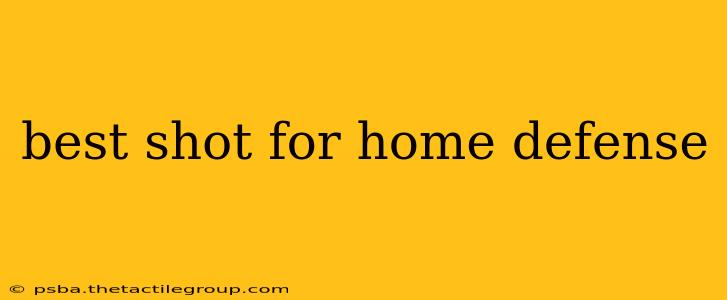Choosing the right firearm for home defense is a serious decision, demanding careful consideration of various factors beyond simple firepower. This isn't about picking the "most powerful" weapon; it's about selecting the tool best suited to your abilities, your home environment, and the legal implications. This guide aims to provide a balanced perspective, helping you make an informed choice.
Factors to Consider Before Choosing a Home Defense Weapon
Before diving into specific firearm types, let's address the crucial elements influencing your decision:
1. Your Proficiency and Experience
- Training is paramount: The most powerful weapon in the world is useless in the hands of someone who can't handle it safely and effectively. Prioritize professional firearms training before even considering a home defense weapon. This training should cover safe handling, proper shooting techniques, and crucial considerations for defensive situations.
- Familiarity with the firearm: Choose a weapon you're comfortable and proficient with. If you've been shooting a particular firearm type for years, sticking with what you know is generally a safer bet than experimenting with something new under pressure.
- Recoil management: Powerful firearms can have significant recoil, impacting accuracy, especially in stressful situations. Consider your ability to manage recoil effectively.
2. Your Home Environment
- Space constraints: A shotgun might be ideal in a large house, but it could be cumbersome and impractical in a small apartment.
- Noise levels: Consider the potential noise disruption to neighbors, especially in close-quarters living situations.
- Accessibility: The firearm needs to be readily accessible in an emergency, but stored securely to prevent accidental discharge or unauthorized access.
3. Legal Considerations
- Local and state laws: Firearm regulations vary significantly by location. Thoroughly research and understand the laws in your area regarding firearm ownership, storage, and use in self-defense.
- Use of force laws: Familiarize yourself with the legal principles surrounding self-defense. Understanding when and how you can legally use a firearm is critical.
Popular Home Defense Weapon Options
With the preparatory factors addressed, let's examine some common home defense firearm choices:
1. Shotguns
- Pros: High stopping power, readily available ammunition, relatively inexpensive.
- Cons: Can be cumbersome to maneuver in close quarters, significant recoil, potential for overpenetration. Requires careful aiming due to the spread of shot.
2. Handguns
- Pros: Easy to store and conceal, relatively easy to handle, versatile ammunition options.
- Cons: Requires more precise shot placement for effective stopping power, can be challenging for some users to master.
3. Rifles (Carbines)
- Pros: High stopping power, relatively accurate at longer ranges, easier to handle than shotguns for some users.
- Cons: Can be cumbersome to maneuver in close quarters, more challenging to store securely, potential for overpenetration.
Ammunition Considerations
The choice of ammunition is as important as the firearm itself. Factors to consider include:
- Stopping power: The ability of the round to incapacitate a threat.
- Penetration: The ability of the round to penetrate walls and other obstacles. Overpenetration is a major concern in home defense situations, as a stray bullet could injure an innocent person.
- Recoil: How the ammunition affects the firearm's recoil.
- Availability: Ensure you can consistently source the ammunition you choose.
Beyond the Firearm: Preparation and Training
Choosing the right firearm is only the first step. Equally important are:
- Regular practice: Maintain your proficiency through regular dry firing and live fire practice.
- Home security plan: Develop a comprehensive home security plan that addresses potential threats and escape routes.
- Emergency preparedness: Have a plan for emergencies, including medical supplies and communication strategies.
Disclaimer: This information is for educational purposes only and should not be considered legal advice. Consult with a qualified firearms instructor and legal professional before making any decisions about home defense. Always prioritize safety and responsible firearm ownership.

